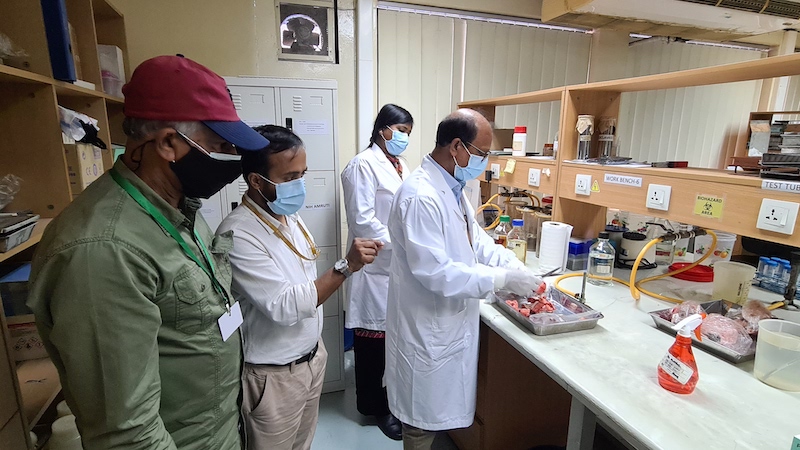
M. Gulam Hussain and M. M. Dey
Overall editing and formatting by Laura Zseleczky
Bangladesh has faced high rates of COVID-19 Delta Plus variant infections since mid-June 2021. The Government of Bangladesh imposed a strict nationwide lockdown from July 1–14, 2021. During this time, no people were allowed to travel by car, bus, train, or air; unnecessary movement of people outside their houses was strictly restricted; and retailers and super markets in the capital city, major regional cities, and small towns were closed all over the country. From July 15–22, the government relaxed the strict lockdown and allowed travel and movement to the markets to celebrate the Eid-ul-Adha holiday, a major Muslim religious function. A strict lockdown was reimposed from July 23 to August 10, restricting travel/movement and other official and social events all over the country to minimize COVID-19 infections and casualties. The government lifted nearly all lockdown and travel restrictions across the country on August 11. As a result, activities across economic sectors have gradually normalized. Due to strict lockdown and restrictions all over the country, most of the Feed the Future Innovation Lab for Fish project teams in Bangladesh could not intiate their field related activities, but these were reinitiated after lifting of such restricions.
From March 1, 2020 to October 31, 2021, 1,569,328 people were infected with COVID-19 in Bangladesh, 27,862 people died, and 1,533,147 people recovered. The Government of Bangladesh has initiated a program to give at least 80% of people the COVID-19 vaccination. So far nearly 20.5 million people, or 20% of the population, have been fully vaccinated (received 2 doses). It is reported that the COVID-19 infection rate has decreased from over 30% from mid-July to early August, 2021 to less than 1.8% during the middle of October, 2021 due to government health regulation awareness and initiation of the massive vaccination program in the country.
Impacts of COVID-19 Delta Variant Infections and Strict Lockdown on Fish Innovation Lab Activities
The Fish Innovation Lab has four ongoing activities in Bangladesh. Each has been impacted by and adapted to COVID-19 and related restrictions differently.
Strict lockdown and travel restrictions prevented the activity on cryogenic sperm banking of Indian major carps and exotic carps from conducting breeding trials in three of four planned regions. The team was also unable to arrange trainings to share the cryopreservation technology with stakeholders. Following the lifting of restrictions and lockdown, many hatcheries had closed for the breeding season, but the team conducted trials in a few hatcheries in the three regions where they were previously unable to travel. They tested the fertilization and hatching rates of rohu, mrigal, and silver carp in Jashore, bighead carp in Faridpur, and silver carp in Barishal. The team also began sampling fry and fingerlings stocked in nursery ponds after the breeding trials and found satisfactory growth of fry and fingerlings produced from the cryopreserved sperm.
Travel restrictions also prevented the activity on harnessing machine learning to estimate aquaculture production and value chain performance from completing filming and production of a series of farmer videos discussing innovative aquaculture practices. Once restrictions were lifted, the team reinitiated field surveys and travelled to the field to monitor project progress and film the farmers as planned. Three videos were produced from this footage on integrated rice-prawn-vegetable farming, women’s employment in the aquaculture value chain, and youth employment in the aquaculture value chain.
The activity on identifying major sources of fecal pathogens in aquaculture value chains also had to adapt due to travel restrictions, postponing focus group discussions with fish supply chain actors and slowing the pace of collecting samples from crowded fish markets. Additionally, university delays and restrictions prevented the team from recruiting graduate students to work with the project. The team was able to resume regular sample collection and lab analysis as planned once the restrictions were lifted.
In response to lockdown and restrictions, the activity on carp genetic improvement limited the number of team members present at research sites, implemented physical distancing protocols, and provided personal protective equipment to staff. The team also suspended in-person monitoring of on-farm trials of the genetically improved carp, but they maintained regular telephone communication with the farmers to stay updated on their progress. Once restrictions were lifted, the team completed their selective breeding trials and started on-farm fish growth sampling.
The Fish Innovation Lab’s Asia regional coordinator visited all project teams to monitor activity progress and provide support once travel restrictions were lifted.
Moving Forward As COVID-19 Restrictions Relax
The COVID-19 Delta Plus variant is more contagious than previous variants and is spreading rapidly from surrounding border districts adjacent to India to all over Bangladesh. The government continues to monitor the situation closely. The prime minister of Bangladesh is aiming for 80% of people to receive the COVID-19 vaccination. Beginning the first week of August 2021, vaccines were available nationwide for adults over 18. The government also opened schools, colleges, and universities.The government initiated a COVID-19 vaccination program for 10 million students ages 12–17 beginning November 1, 2021. The Fish Innovation Lab’s activities in Bangladesh have been impacted by COVID-19 restrictions, but they also have adapted and found innovative ways to continue their research. All the Fish Innovation Lab project teams reinitiated their field and lab activities immediately after the government lifted lockdown and travel/movement restrictions the third week of August 2021. The COVID-19 pandemic situation has greatly improved since those restrictions were lifted, and normal activities across all sectors of life are exptected to resume soon in Bangladesh. Fish Innovation Lab activities in the country will continue to adapt as needed to ensure their work can translate into meaningful improvements in food security, nutrition, and livelihoods for the people of Bangladesh.
M. Gulam Hussain is the Asia Regional Coordinator at the Feed the Innovation Lab for Fish and the former Director General at Bangladesh Fisheries Research Institute (BFRI).
Published December 9, 2021

